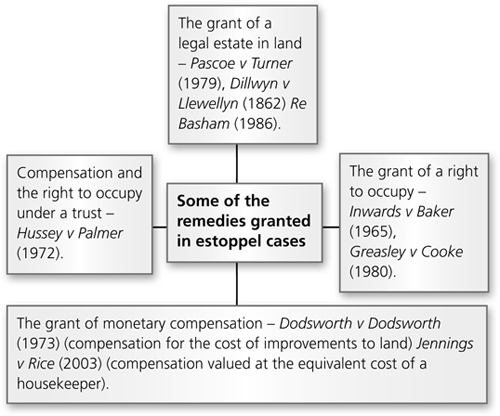Proprietary estoppel

Proprietary Estoppel
Definition
X assures Y of future rights in land and Y relies on the assurance and acts to his detriment.
The Representation
• Must relate to present or future rights in land.
• Promises must be clear and unequivocal but can be made by silence.
• Promises of rights under a will cannot be relied on unless they are clear and have been relied on by the claimant over a long period of time.
Reliance
• Claimant must show a change of position in reliance on the promise.
• The change of position can be quantified in money terms or contributions of labour but must no1 be inconvenience or altered lifestyle.
• The detriment may be suffered by someone other than the claimant.
Detriment
• The representee must be shown to be unconscionably disadvantaged by relying on the promise.
• There may be bars to a claim if the claimant did not act equitably i.e. with ‘clean’ hands.
Nature of the Rights Arising
• Entitles the claimant to equitable relief.
• The right can be entered on the register under s116 LRA 2002; can be an overriding interest.
• Can be binding on third parties.
6.1 Definition of Proprietary Estoppel
1. X, the owner of land, expressly or impliedly gives an assurance to Y respecting present or future rights in land, and Y relies on that assurance acting to his detriment.
2. Proprietary estoppel used to depend on the proof of five probanda under Willmot v Barber (1880):
i) claimant of an equity makes a mistake about his/her legal rights;
ii) on the basis of the mistake the claimant acts to his/her detriment by spending money or carrying out some act;
iii) knowledge by the possessor of the legal right of the other party’s belief;
iv) knowledge by the other party that the belief is mistaken;
v) the other party must have encouraged the claimant in the expenditure incurred.
3. Today the definition of proprietary estoppel depends on three elements:
 a representation (or assurance of rights);
a representation (or assurance of rights);
 reliance (or a change of position);
reliance (or a change of position);
 detriment (or unconscionable conduct).
detriment (or unconscionable conduct).